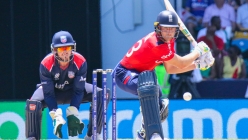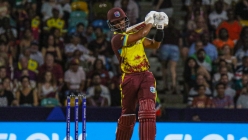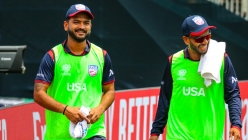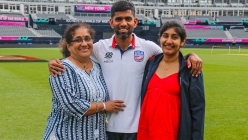Views
Joseph O'Neill's Chuck Ramkissoon is USA Cricketer of the Year
2008 Nov 13 by DreamCricket
By Venu PalaparthiA review of Netherland - Joseph O'Neill's powerful novel about life (and cricket) in New York.
A review of Netherland - Joseph O'Neill's powerful novel about life (and cricket) in New York.
I must admit this book review is the first I have written. And I make no claims that it is an unbiased one. I am a cricket entrepreneur and occasional writer and Netherland is right in my sweet spot - and in cricket-speak, that means an automatic 'big hit.'
I must also confess that until Joseph O'Neill's Netherland came my way, I had only read those Booker longlisted writers that had an Indian connection - the list includes Jhabvala, Rushdie, Roy and Naipaul. I was deeply disappointed when Netherland did not make the shortlist. There is really no Indian connection in Netherland except that the book is about cricket and like the author said recently - cricket is my athletic mother tongue.
The characters in the book have strong resemblances to me and to people I know. Like the narrator, Hans van den Broek, I am an expat with a job in the financial industry who works in Times Square but dabbles in cricket outside of work. And like Hans' son Jake, my four year old plays hide-and-seek thinking that the objective of the game is to be found! Like Khamraj "Chuck" Ramkissoon, who is the true protagonist and the dreamer in this book, I dream about cricket becoming a major sport in USA. Hence the name of our company - DreamCricket.com.

Cricket remains something of a fringe-sport in USA. But for those of us in cricket, it is everything - it is part of our identity. We long for greater recognition (and lesser American resistance) to our beloved sport. As Chuck says "you want a taste of how it feels to be a black man in this country? Put on the white clothes of a cricketer. Put on white to feel black."
[As a sidenote, I wonder what Chuck's reaction might have been had he witnessed Obama's victory.]
Chuck sees himself as an agent of change - the change that USA cricket needs. And he is optimistic about the improvability of American cricket. "Think fantastic," Chuck tells Hans as he explains why he is convinced that a cricket stadium in this part of the world will work. "We must take a more positive attitude. We must claim our rightful place (for cricket) in this wonderful country."
Hans is hesitant to embrace Chuck's plans (which he calls schemes) but warms up gradually and is soon found helping Chuck in his dream project - the Bald Eagle Cricket Field at an abandoned airport (remember Floyd Bennett).
Chuck has several other cricket projects up his sleeve and his optimism is unbridled. "In New Jersey they're overrun with South Asians. Navratri celebrations can bring out twenty thousand people. I've done the research. I've got all the numbers." 'Build it and they will come' is Chuck's mantra. When DreamCricket opened its indoor nets in New Jersey, that was our mantra too.
When Chuck talks excitedly about the turf wicket he wants to put in New York - "the first and the best in the country." I had yet another deja vu moment. In March, I drove some investors to Flemington, NJ - a town known for its factory outlet stores, where a golf range was up for sale. DreamCricket wanted to built a turf wicket there and start "a whole new chapter in U.S. history." In any event, a local church outbid us and that was that.
Hans' pragmatism is a reality check. There is Hans in all of us. Like most cricketers, Hans is an immigrant who lives in USA. Like all of us, Hans navigates the bureaucratic corridors of uncertainty at the DMV and the INS. Every American cricketer will empathize with him, including the circumstances in which he rediscovers cricket, and will certainly want to welcome him into their teams.
As the narrator of this best selling novel, Hans achieves something that perhaps no cricketer in USA has achieved to date. Thanks to him, each and ever reader of this best-selling novel is now familiar with the playing conditions that the cricketer is faced with in USA. In Hans' own words, we all play bush cricket on a "rank outfield that largely undermines the art of batting. The batsman is forced to smash the ball into the air and batting is turned into a gamble."
I am thinking wishfully, but there is a chance, albeit a slim one, that your Parks and Recreation officer has read this book - and if he has, you might have better luck when you ask him or her to cut the grass on the outfield.
Of course, cricket is not the central theme of this book, but it forms a powerful undercurrent, the brightest patch in a quilt woven from memories, relationships and experiences following the tragic events of 9/11. It is cricket that Hans looks forward to in his life - the much needed anchor through his period of personal suffering. And it is the cricket that is gripping for the readers too, because it connects Hans and Chuck, and through them to us.
Read this book - you will be glad you did. And you will understand why Chuck Ramkissoon is the best cricketer in USA there ever was.
Joseph O'Neill plays with the Staten Island Cricket Club in real life. The club is incorporated in the novel.
Post script: As 2008 draws to a close, it is banquet season in New York again, and I am reminded of one incident in the book that recently brought another smile of familiarity. Hans and Chuck go to a New York league annual banquet where, Hans notes "there were two Guyanese brothers at the table" who were importers of sorrel syrup, among other things. That scene was easy to construct in my mind. I know the Guyanese brothers well.




